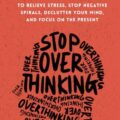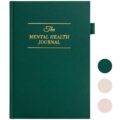Mental health journals help track feelings, thoughts, and behaviors daily. They offer valuable insights into one’s mental well-being.
Also Read
Keeping a mental health journal can greatly improve emotional awareness. It allows you to understand patterns in your moods and triggers. Daily entries create a clear picture of your mental state over time. This practice can be very useful for anyone wanting better mental health.
Simple steps like writing daily thoughts can make a big difference. You don’t need fancy tools—just a notebook and a pen. Consistency is key. Regular journaling can lead to better self-care and stress management. Start small and build the habit. Your mental health will thank you.
Buying Guide On Mental Health Journals For Daily Tracking
mental health journals for daily tracking: a complete buying guide
choosing the right mental health journal is essential. Here are key factors:
1. Size and portability
consider a journal that fits your bag. Smaller journals are easier to carry. Portability helps maintain daily tracking habits.
2. Layout and design
visual appeal matters. Choose a design that you love. Engaging layouts can motivate daily use.
3. Guided vs. Blank pages
guided journals provide prompts. They help structure your thoughts. Blank pages offer freedom for personal expression.
4. Quality of paper
high-quality paper enhances the experience. It prevents ink bleed-through. Look for thick, durable pages.
5. Binding type
binding affects usability. Spiral-bound journals lie flat. Hardbound journals offer a sturdy feel.
6. Prompts and questions
helpful prompts guide your reflections. They make journaling easier. Look for journals with relevant questions.
7. Price and budget
consider your budget. Journals come in various price ranges. Find one that offers value for money.
8. Reviews and recommendations
user reviews provide insights. They highlight pros and cons. Recommendations help make informed decisions.
9. Personalization options
some journals offer customization. Personal touches can increase attachment. Personalized journals make journaling more enjoyable.
10. Additional features
extra features add value. Look for pockets or bookmarks. These can enhance your journaling experience.
Conclusion
Daily tracking with mental health journals can be a powerful tool. It helps you understand your emotions better. Journaling provides a safe space to express feelings. It can also offer insights into patterns and triggers. This practice may help improve your mental well-being.
Consistency is key; even a few minutes a day can make a difference. Over time, you might notice positive changes in your mood. Feel more in control of your mental health journey. Remember, it’s okay to take small steps. Your mental health is important.
Start your journaling today.






















